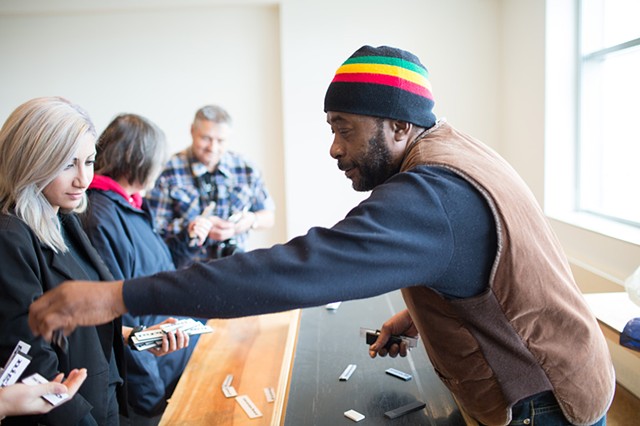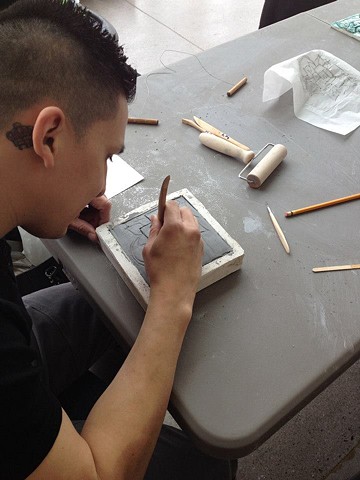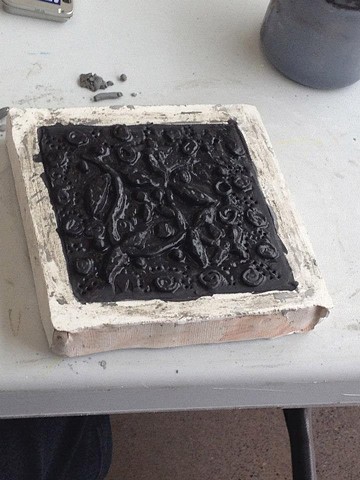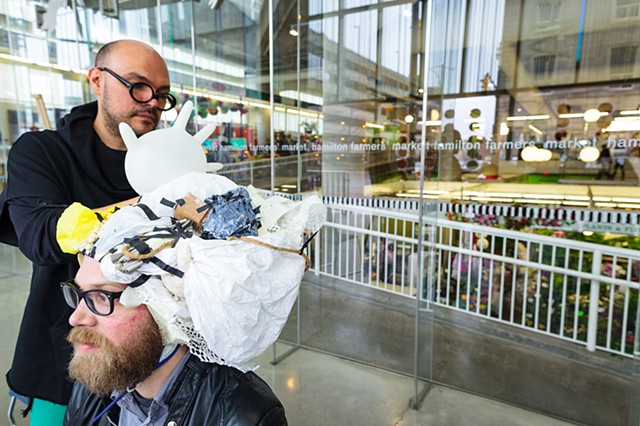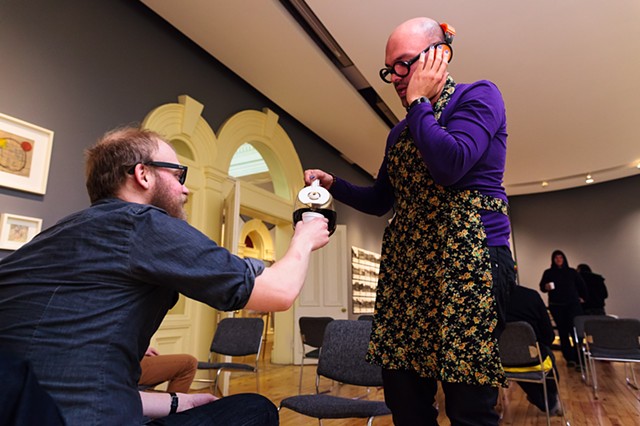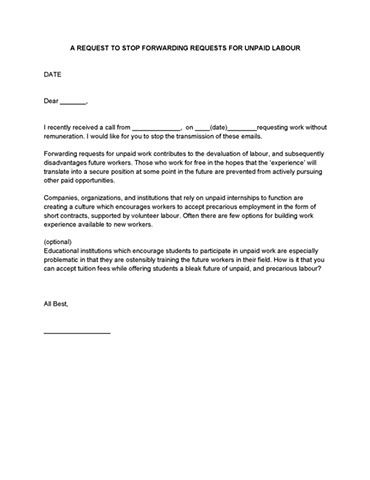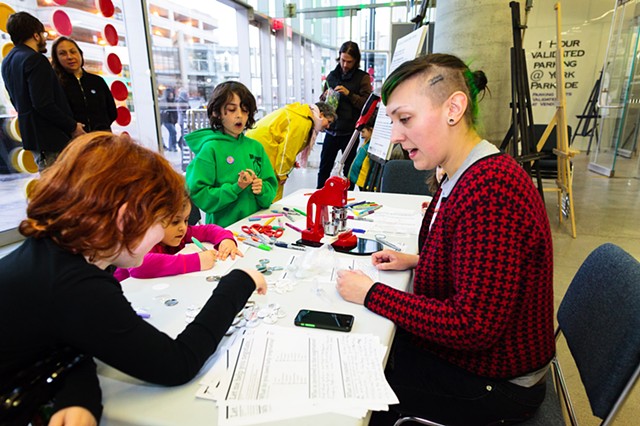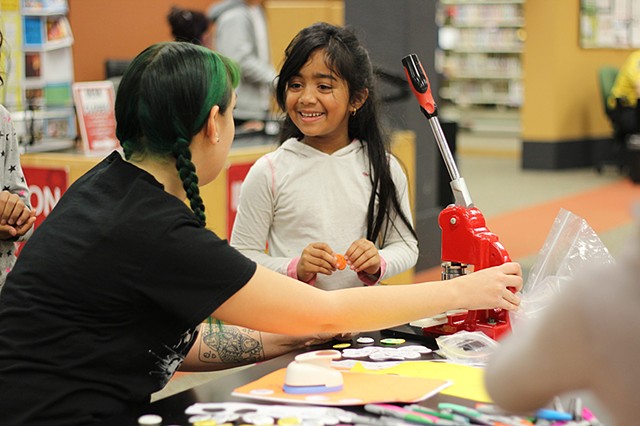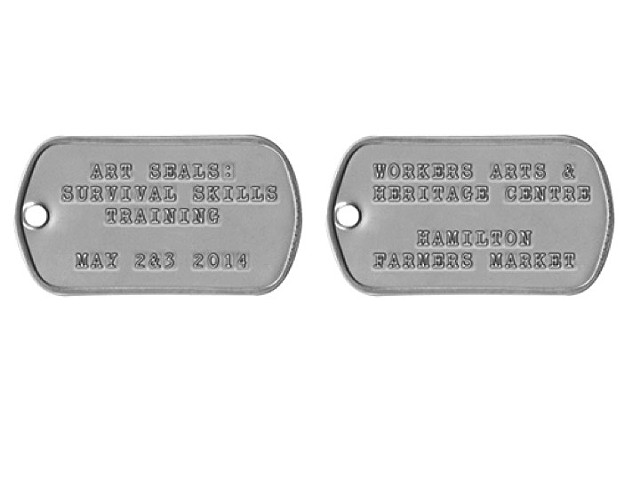Art S.E.A.L.S
Work is about a search for daily meaning as well as daily bread, for recognition as well as cash, for astonishment rather than torpor; in short, for a sort of life rather than a Monday through Friday sort of dying. ― Studs Terkel
Art S.E.A.L.S: Survival Skills Training (2013-14) was a multidisciplinary performance series developed by artists Alana Bartol and Andrew Lochhead that focused on the intersections between artistic practice and the labour that supports it. The project sought to illuminate the economic challenges faced by artists in order to maintain their professional practices and to relate these challenges to discussions being held in artistic communities across the country. The project brought together nine artists from Hamilton and Windsor, Ontario for a series of demonstrations and discussions hosted at art galleries and non-traditional public venues in both cities.
Artists: Josh Babcock (Windsor), Klyde Broox (Hamilton), Andrea Carvalho (Hamilton), J. Arturo Herrera aka Cherry Wood (Windsor), Brian Kelly (Hamilton), Ingrid Mayrhofer (Hamilton), Nadja Pelkey (Windsor), Lisa Pijuan-Nomura (Hamilton), and Michelle Souillère (Windsor).
The title of the work references the United States Navy SEAL program, an elite commando squad recognized for their ability to operate in harsh and unforgiving environments – much like the harsh and unforgiving labour market landscape of the 21st century. Rather than standing for Sea, Air and Land as the military acronym does, Art S.E.A.L.S stands for Art Skills Exchange and Learning Series. A total of 48hrs of participatory performances and discussions took place at 4 different venues Hamilton Farmers’ Market, Workers Arts & Heritage Centre, Hamilton Arts Council, Art Gallery of Windsor, and Windsor Public Library.
Art S.E.A.L.S. was funded by Ontario Arts Council and Windsor Endowment for the Arts. The project was presented as programming for Possible Futures: what is to be done? 2014 Windsor-Essex Triennial of Contemporary Art curated by Srimoyee Mitra and organized by the Art Gallery of Windsor in collaboration with Tourism Windsor Essex, Pelee Island & Windsor Endowment for the Arts.
The projects combine elements of two productions: Artist for Hire and Market Value, curated and developed by Art S.E.A.L.S. co-curators and coordinating artists, Alana Bartol and Andrew Lochhead. Bartol’s 2013 Artist For Hire series invited fifteen Windsor-based artists and/or arts administrators, to perform non-arts skills they had used to generate income through employment outside of their artistic practices. Market Value, created by the Hamilton Arts Council & the Workers Arts & Heritage Centre, saw Lochhead and fellow artist Brian Kelly working in conjunction with HAC director Stephanie Vegh to develop a program that supported the studio practices of Hamilton artists and advocated for the recognition of artistic work as legitimate labour, by paying artists to perform their usually private and unpaid studio labour in public.
Both projects arose from community discussions regarding the often poor working conditions and levels of remuneration within the arts and cultural sector and the need for artists to be able to advocate for themselves as a community of labourers. Both projects aimed at raising public awareness, understanding and recognition of the labour of artists and its various forms, generating discussion within and outside of the arts community on the realities of sustaining a professional artistic practice in regional, ‘post-industrial’ cities in Ontario.
By combining the projects and developing an exchange between Hamilton and Windsor, Bartol and Lochhead hoped to create a more holistic representation of the multiple skill sets (artistic and otherwise), issues surrounding the socio-economic status of artists, and the diverse range of artistic practices in both cities.
In an industry where skills, education and experience are no guarantee of marketplace success, how do artists survive financially and maintain their artistic practice?
Like many cities, both Hamilton and Windsor have recognized the potential of their arts communities as engines of economic development. While artists are generally in support of such a realization, they are also aware of the potential downfalls of such policies that rely on a business model that seems to echo disturbing trends in the private sector, namely the rise of precarious employment, the elimination of pension schemes and unfair work to compensation ratios.
As Windsor and Hamilton move forward with the development of cultural policy and attempt to build strong arts supporting infrastructure and institutions, the coordinating artists feel it is important that artists also advocate for themselves in the process, not only for recognition of what it actually means to live and work as an artist, but for our work to be recognized as a legitimate form of labour.
